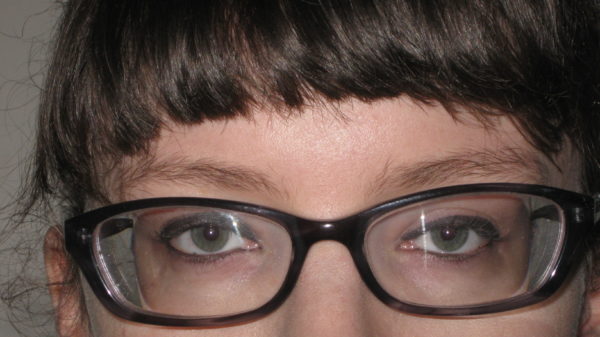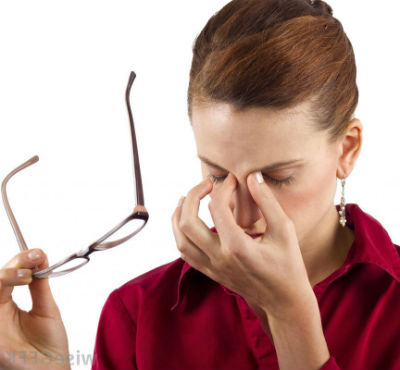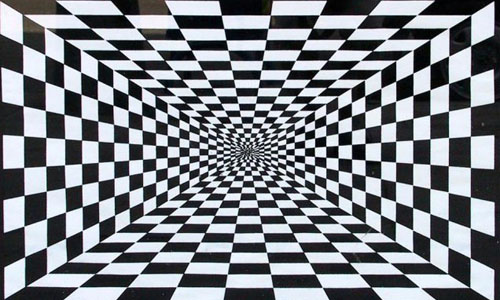You get new glasses, either your first pair or the latest in a long run of stronger glasses, and your vision is distorted. Why?
The short answer is your brain hasn’t adjusted to them.
This brings up the question, do you want your brain to adjust to them? Maybe it’s best they don’t. Read on…
Table of Contents
That Shouldn’t be Clear!
When you’re nearsighted, one way your brain learns to judge distance is by how relatively blurry an object is. This can be true either without glasses or with your old weaker glasses that you don’t see sharply through. When you put stronger glasses on that sharpen up your vision to 20/20 or better, suddenly your brain is telling you everything is closer than it should be. You see the details of the rocks on the ground and the blades of grass, and you feel shorter, like you’re right down there in it.
Light Bending
At the same time, stronger glasses (or your first pair of glasses) cause everything to look smaller. This is because of the distance they sit from your eyes. Contact lenses don’t create this effect.
Have you noticed when a nearsighted person wears strong glasses, the sides of their head through the lenses don’t line up with their head outside them? See an example below. The light is bent, and their eyes appear smaller, along with the rest of their face through the lenses. A similar thing is going on from the other direction.

So on one hand the glasses make you feel like objects are closer, and at the same time they look smaller. It’s disorienting.
You might notice other effects too. Objects might seem like they’re curved, or the top is farther away than the bottom. Any number of things. Your visual system is being forced to re-calibrate itself to perceive the world through these weird things you have on your face that it wasn’t made to see through all the time.
Headaches

You can be getting a headache from your new glasses no matter if they are prescribed “correctly” or not. Some eye doctors will insist that this means there must be an mistake with the prescription, especially if it was some other eye doctor who prescribed it, or there must be some other vision problem that wasn’t addressed. The rationale is that glasses make things better and that certainly glasses would never be causing these headaches.
Most headaches like these are tension headaches. The pain is caused by muscle contractions in the head and neck regions. A feeling of tightness around the eyes, or within the eyes, is evidence of this, not to mention a stiff neck or a need to massage your temples. Why would glasses be causing this? It has to do with the way you use your eyes. There are bad habits that cause chronic tension as you struggle to do something that your body or brain was not designed to do. This is part of what this website is all about.
Dizziness
The headaches might be related to dizziness. Glasses can make you both dizzy and nauseous. All this stuff can be related. Again it’s a perceptual change that your brain doesn’t know how to react to. The placement of objects, movement, and depth perception has all changed, and your brain doesn’t know how to process it yet to reorient your sense of balance, so you feel dizzy.
It should be noted that dizziness and other problems can also come from bad prescriptions or low quality lens materials. In a 2014 study, 45% of glasses ordered online had incorrect prescriptions.
You Get Used to It
Within a couple weeks you get used to it. Your visual system is amazingly resilient, and it will learn to perceive in new environments quickly.
Or usually that’s the case. Some people never really adapt to the glasses, go see the eye doctor again and again, and come away disappointed.
If you have a hard time getting used to new glasses, maybe your brain is trying to tell you something. Glasses are not good for your vision. Most people who start to wear glasses have to get only stronger glasses over the years. There are some exceptions, but that’s the usual course. It’s unfortunate, because it isn’t necessary.
Don’t Make Me Drink Alone
If you run this by your friend who also wears glasses, he will be quick to reassure you that you just need to get used to the stronger glasses. It’s like how drunks don’t want to drink alone. They don’t realize it, but deep inside they feel bad about their drinking habit, but if someone else shares it with them they feel less bad.
Have you ever thought about how you might wean yourself away from glasses for good, and see clearly naturally? Mention this to someone who wears glasses and you’ll most likely get ridiculed and told how there is absolutely no way to reverse nearsightedness other than surgery. But voice your intent to someone who doesn’t wear glasses and you’ll probably get encouragement. Interesting how that works, isn’t it? They aren’t emotionally invested in their condition.
You Can Get Out of Glasses
As I said, your visual system is resilient. No matter how nearsighted you are, you can improve your vision and ditch those glasses for good.
See my article The Problem With Glasses. You have plenty of reasons to get out of your glasses. They’re annoying, uncomfortable, restrict what you can do, and what’s more, they make your vision more blurry without them, and you depend on them more and more for everyday tasks.
Although your eyes can adapt to glasses, it doesn’t mean they like it. Eyestrain is extremely common among people who are nearsighted. Glasses discourage some aspects of normal vision, like peripheral vision awareness and free movement of the eyes, that are necessary for the visual system to fully and efficiently process the visual world around you. When your visual system isn’t able to do that, your vision will suffer. Your eyes won’t focus right. You’ll develop other problems.
So think about going back to your old glasses. Were they so bad? Going back to them may help stop your vision from getting worse. The next step is learning to see without them too.
get help on our Facebook Group!
I founded iblindness.org in 2002 as I began reading books on the Bates Method and became interested in vision improvement. I believe that everyone who is motivated can identify the roots of their vision problems and apply behavioral changes to solve them.

